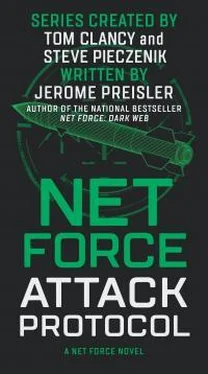Kali steadied herself against the vehicle’s acceleration. She looked down into Emerick’s eyes, and they stared back at her, wide and glassy and barely present. But she saw the fear in them. Whatever shred of awareness he still clung to, he was terribly afraid.
She couldn’t save him. She knew that. But she could ease his way.
Kali spread her fingers over his abdomen, placing one on each of the five points running in a vertical line between the ribs and navel. She applied pressure and leaned closer, feeling the absolute calm that had come upon her at certain moments nearly all of her life. It was neither inside nor outside her, a space without interiority or exteriority.
Long seconds passed. Emerick gasped, a deep, slow breath, different from the rhythmic panting. Kali slid her left hand down off his forehead and took hold of his hand. Its fingers were cold, weak and rubbery. He gasped again, pulling in air. She brought her lips close to the blood-soaked bandages around his head and whispered to him.
There were more shots outside. Kali was peripherally aware of them as the BearCat rumbled along at high speed. She stayed focused on Emerick, whispering, holding his left hand in hers, pressing the points beneath his ribs with the fingers of her opposite one. He breathed again and raised his head. Jimmy Singh cradled it in his hands, and blood and lumps of pale gray brain tissue spilled out into them. He looked at Kali, his dripping hands under the back of Emerick’s head, holding it up off the metal floor.
After a moment the dying man sighed—a long, quiet expulsion of air from deep inside his chest. Then he shuddered softly, and his head sank back down in Singh’s hands, and everything went out of him.
Kali glanced at Singh and turned toward the front of the vehicle, nodding at Spencer as she scrambled past him into her seat.
The BearCat was still rolling fast.
“Emerick?” Dixon said from behind the wheel.
“He’s gone.”
He nodded, staring straight ahead. “We have a change of plans,” he said. “The target’s slipped off.”
“Where is he?”
“In a car heading east. That’s all I know. Except for one more thing.”
“What?”
She silently listened to his answer.
Matei could feel the tension crackling off his men as he hastily gave his instructions. They were professional security personnel, fifteen of his best, and had been elite soldiers in one army or another before going private. Coiled tight in their readiness for action, armed to the teeth, they already knew what to do. They were prepared. But he was in charge. So they listened to him. Or pretended to listen.
He knew how they thought, knew well, because he was very much the same.
The monitoring station where he’d assembled the men could be reached in two ways. From above, one would simply take the stairs behind a false wall panel in the castle’s Grand Hall. The twistier route led through the cellars and then through a door disguised to look like part of a regular wall made of gray masonry. In each case, Drajan Petrovik had chosen to leave the original mechanisms, restoring them to pristine working condition rather than replacing them with electronics. Out of respect, he said, for their ingenious design—and their wily designer, Graguscu the Poisoner.
But Matei suspected Drajan had another unstated reason. This was his seat of operations. Or current seat. The Wolf had many properties here in Satu Mare. Many lairs. Respect for a long-dead count would not factor into his security considerations. When had he shown respect for anyone of aristocratic stature? A master hacker, he knew any electronic security system could be penetrated by another system. As the embarrassing fiasco in Bucharest had proven last summer. It would not surprise Matei to learn that the Wolf had grown to mistrust the sophisticated tools of his own trade and ultimately put greater stock in creaking counterweights, pulleys, and hinges.
That sort of speculation could wait, however. Even as Matei gave his orders, he was keeping a close eye on the video wall to his left and plotting his next moves. Because of his size, people assumed he was slow and dull, a large blunt-force instrument, and he was fine with it. Let his enemies have that impression. Let them underestimate him. It gave him a tactical advantage.
The video wall consisted of twelve sixty-inch high-definition flat-panels, four rows of four, extending from floor to ceiling so its images were easily seen from anywhere in the room, including the presently vacant computer stations along its three other walls. Each of its panels could give multiple views of the castle and its grounds. It was like a huge compound eye.
One section of the display showed the intruders that had gained access to the underground garage. Another showed the group that had splintered off from them. The remaining screens provided views from cameras everywhere around the grounds. These could be automatically displayed through preset sequences or switched over to an operator’s control.
Matei saw the two speeding Rezvanis on the east and west access roads. He saw the armored vehicles in which the intruders had crashed through the front gate. He saw the girl that had come down from the tower room, and he saw the American posted outside what was left of the gate, standing guard with his gigantic shaggy brute of a dog. Interiors, exteriors, everywhere the wall was a moving mosaic of video imagery.
“Okay,” he said. He looked at one of the men, Krask, a thick-bearded former Spetsnaz operator with a portrait tattoo of Vladimir Putin on his neck. The radiance from the monitors made it look almost phosphorescent. “Are you clear on your instructions?”
“Yes.”
Matei’s eyes went from one man to the other.
“And the rest of you?”
Brisk nods from all of them. Probably they were just glad he was nearly finished talking.
“Let’s do our job,” he said.
They hefted their rifles against their sides and fell in line behind him. But Matei was not yet through giving orders. As he led the group up the short passage to the wall panel, he radioed the Rezvani on the east drive over his headset. He was certain of what the bastards in the garage were up to and wanted to arrange a little surprise for them.
At the false wall, Matei turned and reached for one of two stone posts in front of it. The wall slid back on unseen tracks, opening up a passageway that ran on straight ahead through the dimness for several yards before bifurcating like the tongue of a snake. At the split, the group broke into two teams, Krask racing off to the left with his group, and Matei veering to the right with his, leading them down the corridor at a full run.
One hell of a night , he thought. And it wasn’t even close to being over.
The immense torture chamber of Count Graguscu smelled of dampness, mold, and infused mineral deposits. Long gone were the breast rippers, cavaletto , and Judas cradle with which the count once inflicted horrific pain on the wives, lovers, and many others he suspected of a thousand different betrayals. Gone too were the rack, breaking wheel, and thumbscrews he had used to extract confessions from his accused enemies. But there were still thick, rusty chains of indeterminate age hanging from the high, vaulted ceiling, and round iron gratings on the floor still covered the entrances to three deep cells, or oubliettes, where prisoners were once left to rot at the old aristocrat’s suspicious whims. Scabbed with whitish deposits of sediment, the chamber walls were originally done in rough-hewn granite. But if Wheeler’s information was right, not all were original, and some weren’t actually walls.
The question for him was only which were which?
He pressed his Wally through-the-wall-sensor device against the chamber’s stone side like a doctor holding a stethoscope to a patient’s chest. He’d picked the wall to his right going through the archway, only because he needed to start somewhere. But he could just as well have started on the left. Back at Janus, Carmody had insisted that the inside of their castle mock-up be rearranged before each mission rehearsal. Walls, corners, halls, and stairways were repeatedly moved from one place to another. The interior layout of the real place had loomed as a dangerous unknown, and he hadn’t wanted the men getting false ideas of what to expect. If a member of the team thought for a moment that something was where it wasn’t or wasn’t where it was, he could get himself and his teammates killed for a simple misstep.
Читать дальше












